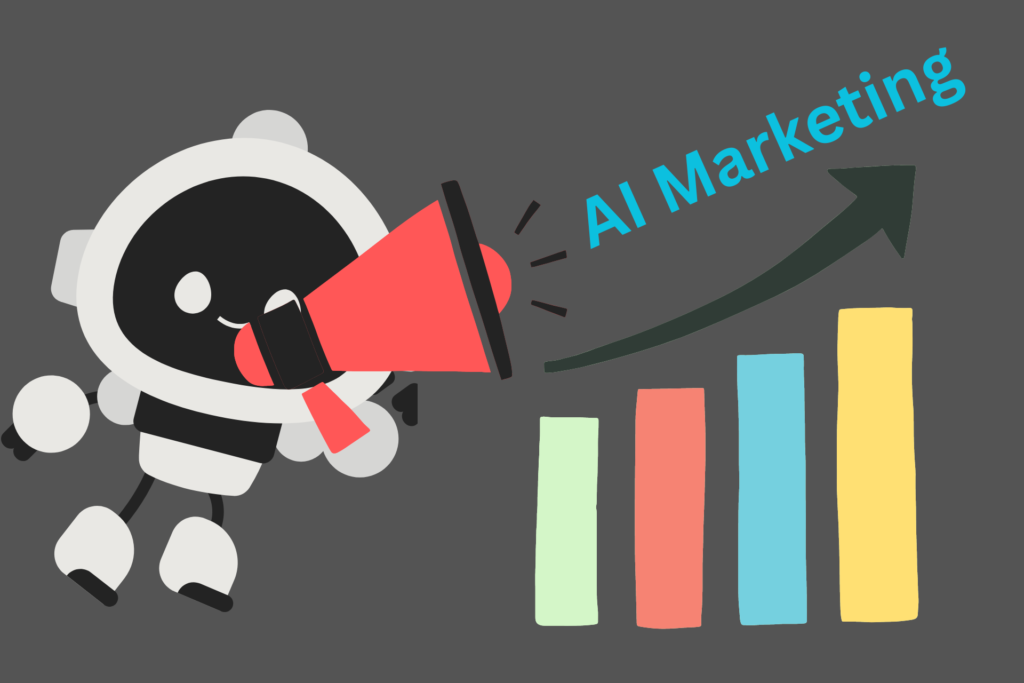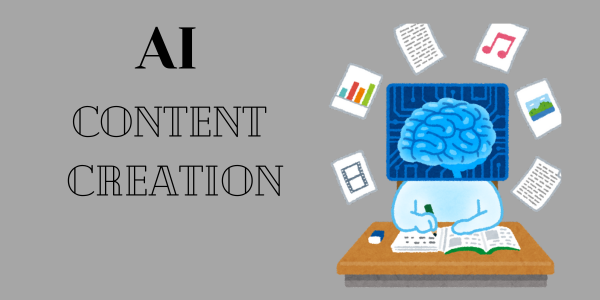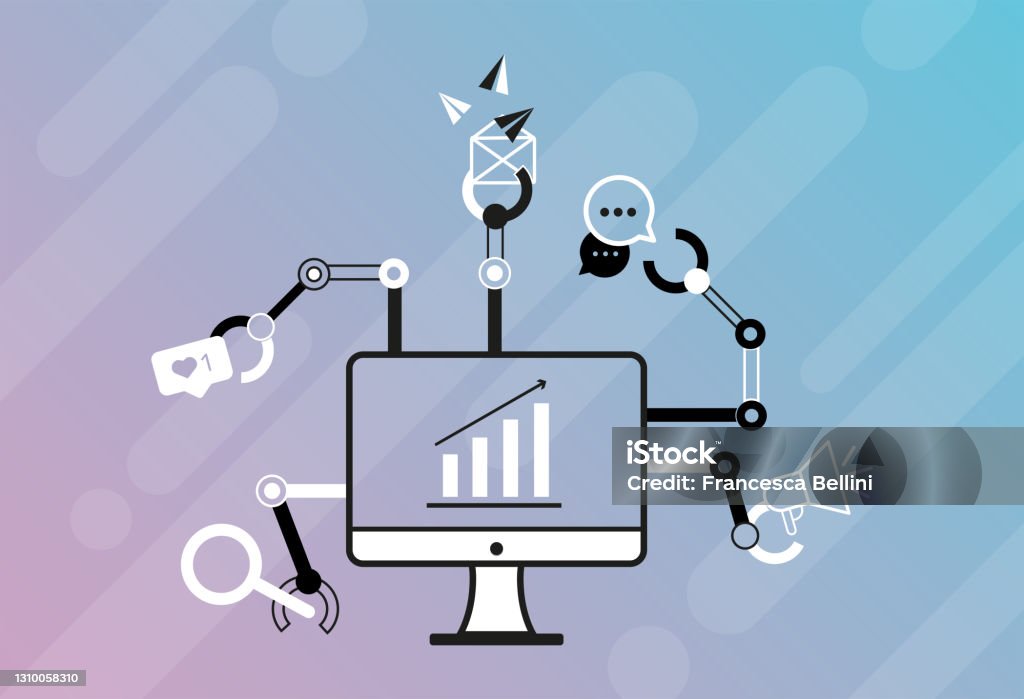Artificial intelligence (AI) is transforming industries across the globe, and marketing is no exception. AI marketing leverages advanced technologies to optimize and enhance various marketing efforts, from personalization to predictive analytics. This blog post delves deep into the world of AI marketing, exploring its benefits, applications, and how you can implement it in your strategy. We will also include relevant images to illustrate key concepts, each with suitable alt text and focus keywords.
What is AI Marketing?
AI marketing refers to the use of artificial intelligence technologies to improve and automate marketing processes. By analyzing vast amounts of data, AI can provide valuable insights, automate repetitive tasks, and personalize customer experiences.

Personalization in AI Marketing
One of the most significant benefits of AI marketing is personalization. AI enables businesses to segment audiences more accurately and deliver personalized content that resonates with individual customers. Personalization in AI marketing is not just about addressing customers by their names; it’s about understanding their behaviors, preferences, and needs, and delivering the right message at the right time.
Customer Segmentation in AI Marketing
Customer segmentation is the process of dividing a customer base into groups of individuals that are similar in specific ways relevant to marketing. AI marketing tools analyze extensive customer data to segment audiences based on behavior, preferences, and demographics. This allows marketers to target specific groups with tailored messages, increasing engagement and conversion rates.
For example, an e-commerce company might use AI to segment customers into groups such as frequent buyers, seasonal shoppers, and first-time visitors. Each group would receive different marketing messages designed to appeal to their unique shopping behaviors. This level of segmentation ensures that marketing efforts are more efficient and effective, leading to higher customer satisfaction and loyalty.
Personalized Content in AI Marketing
AI can recommend personalized content for each user based on their past interactions and preferences. This can include product recommendations, personalized emails, and tailored website experiences. For instance, streaming services like Netflix and Spotify use AI algorithms to suggest shows, movies, and songs based on a user’s viewing or listening history. This kind of personalization not only enhances the user experience but also increases the likelihood of engagement and retention.
Personalized emails are another powerful application of AI marketing. Instead of sending generic emails to all subscribers, AI can help craft personalized messages that address individual interests and needs. For example, if a customer frequently purchases outdoor gear, they might receive emails featuring new arrivals in that category or special offers on related products. Personalized emails have been shown to have higher open and click-through rates, which translates to better ROI for marketing campaigns.
Dynamic Websites in AI Marketing
With AI, websites can dynamically adapt their content in real-time to match the interests and behaviors of visitors. This ensures that each visitor sees content that is most relevant to them, enhancing their experience and likelihood of conversion. For instance, an online retailer could use AI to show different products on their homepage depending on the visitor’s past browsing history. A visitor who previously looked at running shoes might see a homepage featuring the latest running gear, while someone interested in home decor might see featured items from that category.
Dynamic websites can also use AI to provide personalized recommendations as visitors navigate the site. If a user adds a pair of jeans to their cart, AI might suggest complementary items such as shirts or accessories. This not only improves the shopping experience but also increases the average order value.
Moreover, dynamic pricing is another aspect of AI-driven personalization. AI algorithms can adjust prices in real-time based on demand, competition, and customer behavior. This strategy, commonly used by airlines and ride-sharing companies, helps maximize revenue and provide competitive pricing to customers.
Predictive Analytics in AI Marketing
Predictive analytics stands as a cornerstone in the realm of AI-driven marketing strategies. By delving into historical data, AI possesses the capability to forecast future trends and behaviors, thereby empowering marketers to make more informed decisions. Such analytics can play a pivotal role in various aspects of marketing, ranging from sales forecasting to customer churn prediction and estimation of customer lifetime value.
Sales Forecasting
In the domain of sales forecasting, AI tools can leverage past data to predict future sales trends. This predictive ability aids businesses in planning inventory, staffing, and marketing endeavors more effectively. For instance, envision a retail establishment utilizing predictive analytics to anticipate the popularity of certain products during festive seasons. Armed with these insights, they can strategically stock up on in-demand items and tailor their marketing campaigns to highlight these products, thereby maximizing sales opportunities.
Churn Prediction
Another significant application of predictive analytics lies in churn prediction. AI algorithms can discern patterns indicative of customers who are likely to churn or discontinue their engagement with a business. Armed with this foresight, marketers can proactively intervene to retain these customers. For instance, a subscription-based service may employ predictive analytics to identify users exhibiting behaviors signaling potential churn. Subsequently, they can devise targeted retention strategies, such as offering personalized promotions or enhanced customer support, to incentivize continued subscription.
Customer Lifetime Value
Understanding the lifetime value of customers is paramount for businesses aiming to foster enduring relationships and maximize revenue streams. Through predictive analytics, AI tools can analyze data to discern which customers are poised to yield the most value over the long term. Armed with this knowledge, marketers can tailor their efforts to nurture and retain high-value customers, thereby bolstering overall profitability and sustainability.
Predictive analytics not only furnishes invaluable insights but also serves as a catalyst for data-driven decision-making in marketing endeavors. By harnessing the power of predictive analytics, marketers can optimize their strategies, fortify customer retention initiatives, and propel organizational growth. As the landscape of AI technology continues to evolve, the potential for predictive analytics to revolutionize marketing practices will only burgeon, presenting businesses with unparalleled opportunities to gain a competitive edge in their respective industries.
Automation in AI Marketing
Automation serves as the backbone of AI-driven marketing, streamlining processes and enabling businesses to scale their efforts efficiently. Within the realm of AI marketing, automation manifests in various forms, ranging from chatbots and email marketing automation to ad campaign management and content generation.
Chatbots in AI Marketing
AI-powered chatbots have emerged as indispensable assets for businesses, facilitating seamless customer interactions and support round the clock. These virtual assistants leverage AI algorithms to understand and respond to customer inquiries, provide personalized recommendations, and guide users through the sales funnel. By deploying chatbots, businesses can enhance customer satisfaction, alleviate the burden on human resources, and deliver consistent support experiences across multiple touchpoints.
Email Marketing Automation
Email marketing automation represents another cornerstone of AI-driven marketing strategies. AI algorithms can automate various aspects of email marketing campaigns, including segmentation, personalization, and scheduling. By analyzing user behavior and engagement metrics, AI can tailor email content to resonate with individual recipients, thereby maximizing open rates and conversion opportunities. Furthermore, automated email workflows enable businesses to nurture leads, re-engage dormant customers, and deliver timely communications throughout the customer journey.
Ad Campaign Automation
In the realm of digital advertising, AI plays a pivotal role in automating ad campaign management and optimization. AI-powered platforms leverage data-driven insights to adjust bidding strategies, target audience segments, and ad placements in real-time, maximizing return on investment (ROI) and campaign effectiveness. Through continuous monitoring and optimization, AI ensures that ad campaigns remain aligned with marketing objectives and deliver optimal results across various channels, including search engines, social media platforms, and display networks.
Content Generation and Curation
AI-driven content generation and curation streamline the process of creating and disseminating engaging content at scale. AI algorithms can analyze vast datasets to generate written content, such as product descriptions, blog posts, and social media updates, tailored to resonate with target audiences. Additionally, AI-powered content curation tools can sift through an abundance of online content to identify relevant articles, videos, and images for sharing across digital channels. By automating content creation and curation, businesses can maintain a consistent presence, foster audience engagement, and drive traffic to their digital assets.
Automation lies at the heart of AI marketing, empowering businesses to optimize processes, enhance customer experiences, and drive measurable results. By embracing automation technologies, marketers can unlock efficiencies, streamline workflows, and focus their efforts on strategic initiatives that drive business growth. As AI continues to evolve, the potential for automation to revolutionize marketing practices will only expand, offering businesses unprecedented opportunities to innovate and thrive in a competitive landscape.
3.5
Content Generation in AI Marketing
AI tools can generate written content, such as product descriptions, blog posts, and social media updates. These tools use natural language processing to create human-like text that aligns with brand voice and messaging.
Content Curation in AI Marketing
AI can curate relevant content for newsletters or social media based on user interests and trending topics. This keeps your audience engaged with fresh and pertinent content without requiring constant manual effort.

AI-Powered Content Discovery
AI algorithms play a pivotal role in content curation by sifting through vast volumes of online content to identify articles, videos, images, and other media that align with specific topics or themes. These algorithms leverage machine learning techniques to analyze content attributes such as relevance, quality, and engagement metrics, enabling businesses to surface high-value content that resonates with their target audience. By automating the content discovery process, businesses can stay abreast of industry trends, thought leadership insights, and relevant news developments, thereby enriching their content marketing efforts.
Personalized Content Recommendations
AI-driven content curation platforms utilize sophisticated recommendation engines to deliver personalized content recommendations to individual users based on their preferences, interests, and past engagement behavior. By leveraging data analytics and user profiling techniques, these platforms can tailor content recommendations to each user’s unique preferences and browsing history, thereby enhancing user engagement and driving content consumption. Whether recommending articles, videos, or product recommendations, AI-powered content curation enables businesses to deliver relevant and timely content experiences that resonate with their target audience, ultimately fostering brand loyalty and advocacy.
Automated Content Distribution
Once curated content has been identified and personalized recommendations generated, AI-powered content curation platforms facilitate the seamless distribution of curated content across various digital channels. From social media platforms and email newsletters to content aggregation websites and mobile apps, businesses can leverage AI to automate the scheduling, publishing, and syndication of curated content, ensuring maximum reach and visibility among target audiences. By streamlining the content distribution process, businesses can amplify their content marketing efforts, drive website traffic, and nurture relationships with their audience across multiple touchpoints.
Performance Analytics and Optimization
In addition to facilitating content discovery, recommendation, and distribution, AI-powered content curation platforms offer robust analytics capabilities that enable businesses to measure the performance and impact of their curated content initiatives. Through comprehensive performance dashboards and actionable insights, businesses can gain visibility into key metrics such as engagement rates, click-through rates, and conversion metrics, allowing them to assess the effectiveness of their content curation efforts and optimize their strategies accordingly. By leveraging AI-driven analytics, businesses can refine their content curation strategies, identify emerging trends, and capitalize on opportunities to drive meaningful business outcomes.
Content curation in AI marketing represents a powerful strategy for businesses looking to engage their target audience, build brand authority, and drive customer acquisition and retention. By harnessing the capabilities of AI-driven content curation platforms, businesses can streamline the content discovery, recommendation, distribution, and optimization process, thereby maximizing the impact of their content marketing efforts and achieving their business objectives in an increasingly competitive digital landscape.
Customer Insights and Data Analysis in AI Marketing
AI marketing provides deeper insights into customer behavior and preferences, enabling more effective strategies and decision-making.
Sentiment Analysis in AI Marketing
AI can analyze customer reviews and social media interactions to gauge public sentiment about products or brands. This helps businesses understand how customers feel and respond accordingly.
Market Research in AI Marketing
AI marketing tools can analyze trends, competitors, and market conditions to inform strategy. This ensures that businesses stay ahead of the curve and make data-driven decisions.
User Behavior Tracking in AI Marketing
AI can monitor how users interact with websites and products, providing valuable insights into their preferences and pain points. This information can be used to optimize user experience and marketing strategies.
Voice Search Optimization in AI Marketing
As voice search becomes more prevalent, optimizing for voice search is an essential aspect of AI marketing.
Voice SEO in AI Marketing
Optimizing content for voice search queries involves understanding how people speak naturally. AI marketing tools can help identify and incorporate these queries into your SEO strategy.
Natural Language Processing (NLP) in AI Marketing
NLP allows AI to understand and leverage natural language, improving the relevance and accuracy of search results and customer interactions.
Enhanced Advertising with AI Marketing
AI marketing enhances advertising efforts, making them more targeted, efficient, and effective.
Programmatic Advertising in AI Marketing
AI automates the buying of ads, targeting the right audience at the right time with personalized messages. This increases the efficiency and effectiveness of advertising campaigns.
Ad Creatives in AI Marketing
AI can generate and test different ad creatives to find the most effective versions. This ensures that your ads resonate with your audience and achieve the best possible results.

Improved ROI Measurement in AI Marketing
AI marketing provides more accurate and comprehensive ROI measurement, helping businesses understand the impact of their efforts and optimize accordingly.
Attribution Models in AI Marketing
AI can provide more accurate attribution models, showing which marketing efforts are driving results. This helps businesses allocate resources more effectively.
Performance Analysis in AI Marketing
AI continuously analyzes campaign performance, providing insights and recommendations for improvement. This ensures that marketing strategies are always optimized for maximum ROI.
Implementing AI in Marketing
Implementing AI in your marketing strategy involves several steps. Here’s a step-by-step approach to get started:
Identify Objectives for AI Marketing
Determine what you want to achieve with AI marketing, whether it’s better customer insights, automation, personalization, or all of the above.
Collect Data for AI Marketing
Gather and organize your customer and market data. This data will be crucial for training your AI models and deriving insights.
Choose the Right Tools for AI Marketing
Select AI tools and platforms that fit your objectives. Some popular AI marketing tools include:
- HubSpot: For automation and analytics.
- Salesforce Einstein: For predictive analytics and personalization.
- Google Analytics and Google Ads: For insights and ad optimization.
- IBM Watson: For a wide range of AI applications, including NLP and sentiment analysis.
Integrate Systems for AI Marketing
Ensure your AI tools integrate well with your existing marketing systems. This ensures a smooth transition and optimal performance.
Train and Test AI Marketing Models
Train your AI models on your data and test them to ensure they provide valuable insights. This step is crucial for the accuracy and effectiveness of your AI marketing efforts.
Monitor and Optimize AI Marketing Efforts
Continuously monitor the performance of your AI marketing tools and make adjustments as necessary. This ensures that your strategies remain effective and up-to-date.

Conclusion
AI marketing is revolutionizing the way businesses approach marketing, offering unparalleled opportunities for personalization, predictive analytics, automation, and more. By leveraging AI technologies, marketers can gain deeper insights, optimize their efforts, and deliver more personalized experiences to their customers. Implementing AI in your marketing strategy requires careful planning and ongoing optimization, but the benefits are well worth the investment.
By understanding and embracing AI marketing, businesses can stay ahead of the competition and drive better results in an increasingly digital and data-driven world.
See Also
AI in Digital Marketing — The Complete Guide
How to Increase Website Traffic from 0 to 3,000 Visitors per Month?

